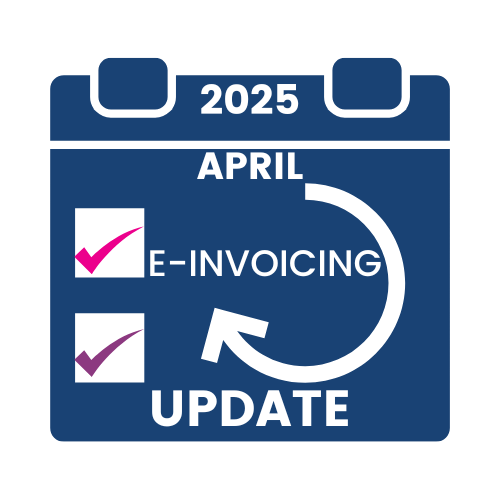Guatemala
Guatemala has released five new electronic tax documents for simplified tax regimes. New electronic tax documents were created by the Superintendency of Tax Administration (SAT) for the “Livestock” and “Primary” tax regimes regulated under Decree No. 31-2024.
Saudi Arabia
ZATCA announces wave 21 of the Integration Phase. Taxpayers in the 21st wave of the e-invoicing mandate Phase 2 must integrate with the FATOORA platform no later than November 30, 2025.
ZATCA announces taxpayer wave 22 of the Integration Phase. Taxpayers included in the twenty-second wave must issue e-invoices and integrate with the FATOORA platform by December 31, 2025.
EU
The ViDA proposal receives final approval from the European Council. After much anticipation, revision and deliberation, the VAT in the Digital Age (ViDA) package has received its final seal of approval.
ViDA package has been published in the official journal of the European Union. After recent ratification on March 11, 2025, the ViDA package is now steps closer to entering into force. Starting April 14, 2025, Member States may begin introducing domestic e-invoicing obligations and no longer require approval from the European Commission.
Croatia
Croatia comes one step closer to mandating B2B e-invoicing. The Croatian Ministry of Finance launched a public consultation regarding the draft law on ‘fiscalization’, which includes mandating e-invoicing and e-reporting between entities trading within the VAT system.
United Arab Emirates
UAE releases service provider accreditation requirements. As a vital step in establishing the framework for the upcoming 5-corner model, the UAE Ministry of Finance released the accreditation requirements for service providers.
Italy
B2C healthcare e-invoice ban extended through 2025. The Milleproroghe Decree 2025 has been converted into Law, extending the ban on issuing healthcare e-invoices to natural persons (B2C) for those required to submit data to the Health Card System (Sistema Tessera Sanitaria) until December 31, 2025.
Spain
Second public consultation on Crea y Crece e-invoicing regulations. Spain is progressing with its mandate to implement electronic invoicing for business transactions. A second public consultation on the Draft Royal Decree “Crea y Crece” reveals key regulatory updates.
Spain officially extends Veri*factu compliance deadlines for taxpayers using a two-phased approach. The Spanish Tax Authorities have announced an extension to the compliance deadlines for the Veri*factu regulation, which mandates specific requirements for invoicing software used by businesses and professionals.
Belgium
Further change of e-invoicing obligations scope. Belgium has amended the scope of taxpayers required to adhere to the obligatory B2B e-invoicing requirements beginning January 1, 2026.
Philippines
Philippines issues new regulations on the upcoming e-invoicing mandate. The Philippines has issued Revenue Regulations 11-2025, defining updated issuance and reporting requirements as well as an extension to the taxpayers in scope for the upcoming obligation. Taxpayers in scope will have to start issuing e-invoices by March 2026 and report the data following establishing a system capable of storing and processing the transmitted data.
Philippines introduces Pre-border Technical Verification and Cross-border E-invoicing. In a move to streamline customs clearance and invoicing procedures, the Philippine Bureau of Customs (BOC) introduces Pre-border Technical Verification (PTV) and a Cross-border E-Invoicing (CEI) system. The systems will require foreign exporters in scope to register and issue invoices in the CEI system, and to provide details on the export characteristics through the PTV.
France
Draft amendment proposes delaying the French CTC mandate. Following last year’s significant changes to the French reform, a draft amendment was adopted on March 24, 2025, by a committee of the National Assembly proposing to delay the introduction of the French CTC mandate by one year. The amendment is not yet legally binding and is still going through the legislative process, with a final decision expected in April 2025.
Denmark
The Danish Business Authority has announced postponing the final release date for the new version of the Danish e-invoicing format OIOUBL 3. The final release of the invoice package is now expected in October 2025.
Denmark expands digital bookkeeping obligation to encompass additional entities. Denmark has broadened the digital bookkeeping regulations to include companies without a requirement to submit financial reports. The expansion comes after strong support during public consultation, resulting in two new executive orders mandating the extension. Starting January 1, 2026, the changes will affect approximately 118,000 additional businesses.
Germany
Germany aligns small business rules with EU Directive 2020/285. On March 18, 2025, Germany’s Ministry of Finance published new regulations for small businesses, aligned with EU Directive 2020/285, updating the German VAT Act and Annual Tax Act 2024.
Expansion of B2G e-invoicing requirements in Germany. The Rhineland-Pfalz E-Invoicing Ordinance RLP 2025 mandates electronic invoicing for public entities in alignment with Directive 2014/55/EU since April 1, 2025. In Hessen, a similar mandate took effect on April 18, 2024, initially permitting e-invoice submissions only via e-mail.
Greece
E-transport obligation has been postponed again. On April 1, 2025, the Independent Authority for Public Revenue (AADE) announced that the timelines to adhere to the new e-transport framework have been postponed.
Angola
Angola is preparing to introduce electronic invoicing for resident companies and a prize invoice scheme for individual taxpayers, according to the President of the General Tax Administration Board (AGT). Compliance will include using AGT-validated software and real-time data transmission.
Bulgaria
Bulgaria officially adopts SAF-T requirements starting in 2026. The Bulgarian 2025 State Budget has been adopted, formally introducing the requirement for businesses to submit Standard Audit File for Tax (SAF-T file) as of January 1, 2026.
Slovakia
Slovakia introduces decentralized e-invoicing via Peppol. Slovakia tax authorities’ spokesperson announced that the FS has launched a project to establish an e-invoicing environment, which will lead to mandatory countrywide e-invoicing. The main goal is to digitalize the invoicing process, and to do so, the FS decided to join the Peppol network and establish a decentralized e-invoicing solution.
Ivory Coast
Ivory Coast implements electronic standardized invoicing system to streamline tax control. The Ivory Coast introduces the Electronic Standardized Invoice System (FNE) and the Electronic Standardized Receipt System (RNE). Following a phased roll-out, issuance obligations became effective for the first taxpayer group on April 1, 2025, with full implementation expected on September 1, 2025.
Poland
The Ministry of Finance provides clarifications on KSeF in the parliamentary answers. The Polish Ministry of Finance (MoF) answered parliamentary questions regarding KSeF, confirming that mandate postponement is not planned.
South Africa
South African Revenue Service mandates invoice data in electronic customs declarations. South African Revenue Service (SARS) requested invoice data in all electronic customs declarations.
France
Amendment to postpone the French CTC mandate rejected by Parliament. The National Assembly rejected the amendment to postpone the French CTC mandate. The introduction of the reform on September 1, 2026, remains.




